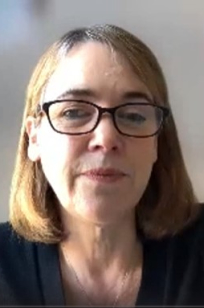Maximise value from Covid innovations, says NHS Scotland chief executive
Speaking to finance practitioners at a virtual HFMA Scotland branch session this week, the head of the Scottish health service said the service needed to harness some of the successful changes that had been rapidly implemented as part of the response to Covid-19.
‘Take the example of Near Me,’ said Ms Lamb (pictured), referring to the video consulting service that was rolled out across Scotland last year. ‘This time last year we were doing about 300 consultations a week using virtual means. We are now up to over 22,000 consultations a week.’
While the service was ‘ready-to-go’, it hadn’t been widely adopted. And although it was rolled-out to meet the urgent requirement to reduce face-to-face contacts, the benefits were far wider ranging – saving travelling time for patients and reducing the service’s carbon footprint.
She said she was ‘encouraged’ to hear that the HFMA was planning to undertake work around the digital agenda and retention of innovative practices. ‘When we evaluate innovations, we are often not looking at the resource aspects,’ she said. ‘It is really important that we understand this, because we can’t afford to just keep pushing more money at things, which we have been doing over the last year.
‘There’s going to come a point where we have to move back into a sustainable position. So we need to be clear about where we are investing – not just in Near Me but in the redesign of urgent care. What does that mean and what is the knock-on impact of that.’
Scotland has put a lot of infrastructure in place to deal with testing, contact tracing and vaccinations, as well as its digital offerings. And while this was still really important right now, the service would need to look how it could maximise the value from this in future. The structures around vaccination were a good example.
‘Vaccination isn’t new,’ she said. ‘We have immunisation programmes that run every year. But we didn’t have a particularly good infrastructure to underpin them. But we’ve now got a vaccine management tool that can record the detail of a vaccination event at the point of vaccination. We’ve got the national scheduling system. Now we need to make sure we are using those things to support the regular vaccination programmes.’
Other areas should also be explored. People have been receiving results of Covid-19 tests direct to their mobile phones. ‘Should that just be Covid or should we be thinking about that for other diagnostic tests as well?’ she said.
Ms Lamb also highlighted the need for the NHS to play a bigger role in economic recovery following the pandemic. ‘We know there’s been a huge amount of damage done by the pandemic,’ she said. ‘It has impacted on our economy, on education and on our way of life. And some of the inequalities that were already in our system will have been exacerbated.
‘So, as we start to build back health and care systems, we [need to] to think more broadly about the money we spend. How can we use our recurring resource to support employment in deprived communities? [We need to] think about where we are buying goods and how we can use that to support localities and how we can start to reduce our carbon footprint.’
For the current year, the usual financial planning arrangements were suspended to enable the service to focus on its pandemic response, with NHS boards and integration authorities fully funded to deliver a financial balance.
The Scottish government’s medium term financial framework for health and social care identified the need to save £1.7bn between 2016/17 and 2023/24. While Covid-19 has clearly had an impact on the sector’s ability to meet this trajectory, the pressure on resources is still significant.
Scotland has an escalation framework, with boards placed at one of five different levels depending on performance and their need for support. Audit Scotland’s annual review of NHS Scotland, published in February, confirmed that six boards were at level 3 or 4 at the end of 2019/20
Ms Lamb said discussions were ongoing about how to support boards through recovery. ‘What we don’t want to do is to get to a point where we’ve got everybody on the escalation framework because it is too hard to be anywhere else,’ she said. ‘We are looking at trying to manage through that position.’ Continuing the close communication and understanding between boards and the centre, which has been a feature of the pandemic response, would be really important to achieving this.
The HFMA Scotland Branch is running a series of breakfast webinars and briefings. A session on 29 April will explore transformational change. In particular, it will hear about the New Zealand Canterbury District Health Board’s integration journey and its recovery after a series of earthquakes and aftershocks in 2010/11. Find out more about joining the HFMA.
‘
Related content
We are excited to bring you a fun packed Eastern Branch Conference in 2025 over three days.
This event is for those that will benefit from an overview of costing in the NHS or those new to costing and will cover why we cost and the processes.